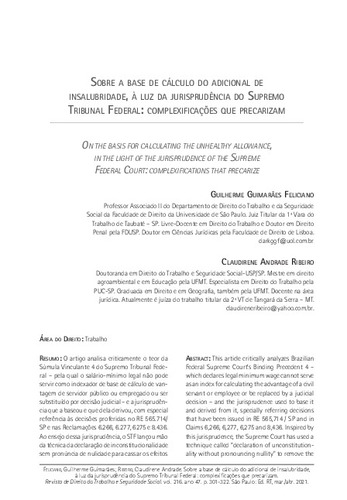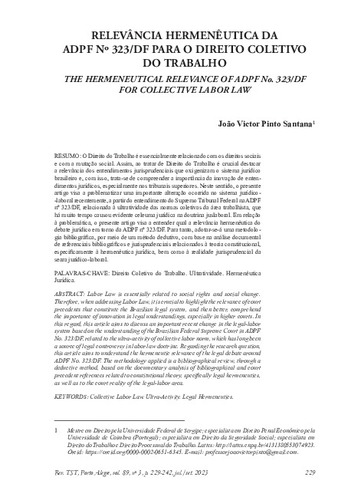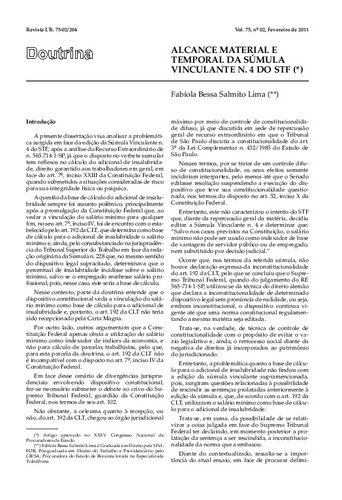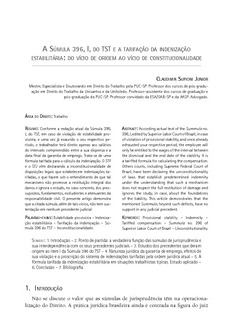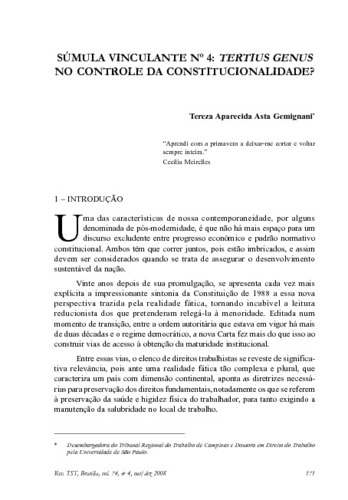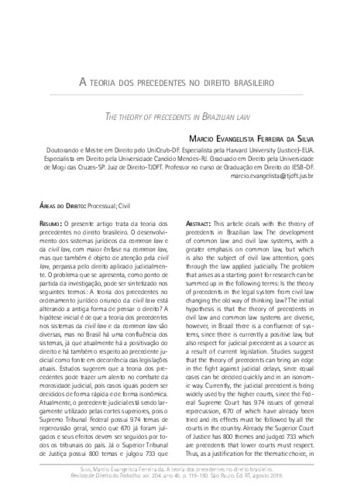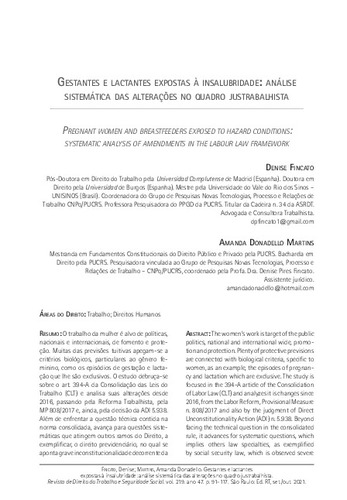Artigo de periódico
Sobre a base de cálculo do adicional de insalubridade, à luz da jurisprudência do Supremo Tribunal Federal: complexificações que precarizam
| dc.contributor.author | Feliciano, Guilherme Guimarães | |
| dc.contributor.author | Ribeiro, Claudirene Andrade | |
| dc.date.accessioned | 2021-03-18T11:33:35Z | |
| dc.date.available | 2021-03-18T11:33:35Z | |
| dc.date.issued | 2021-04 | |
| dc.identifier.citation | FELICIANO, Guilherme Guimarães; RIBEIRO, Claudirene Andrade. Sobre a base de cálculo do adicional de insalubridade, à luz da jurisprudência do Supremo Tribunal Federal: complexificações que precarizam = On the basis for calculating the unhealthy allowance, in the light of the jurisprudence of the Supreme Federal Court: complexifications that precarize. Revista de direito do trabalho e seguridade social, São Paulo, v. 47, n. 216, p. 301-322, mar./abr. 2021. | pt_BR |
| dc.identifier.citation | FELICIANO, Guilherme Guimarães; RIBEIRO, Claudirene Andrade. Sobre a base de cálculo do adicional de insalubridade, à luz da jurisprudência do Supremo Tribunal Federal: complexificações que precarizam. Revista eletrônica [do] Tribunal Regional do Trabalho da 9ª Região, Curitiba, v. 11, n. 109, p. 80-103, maio 2022. | |
| dc.identifier.uri | https://hdl.handle.net/20.500.12178/182979 | |
| dc.description.abstract | [por] Analisa criticamente o teor da Súmula Vinculante 4 do Supremo Tribunal Federal – pela qual o salário-mínimo legal não pode servir como indexador de base de cálculo de vantagem de servidor público ou empregado ou ser substituído por decisão judicial – e a jurisprudência que a baseou e que dela derivou, com especial referência às decisões proferidas no RE 565.714/ SP e nas Reclamações 6.266, 6.277, 6275 e 8.436. Ao ensejo dessa jurisprudência, o STF lançou mão da técnica da declaração de inconstitucionalidade sem pronúncia de nulidade para cassar os efeitos da Súmula 228 do TST, que, à vista da referida SV 4, havia estipulado que a base de cálculo do adicional de insalubridade deveria ser o salário básico do trabalhador, por óbvia integração analógica estribada na hipótese do adicional de periculosidade (excetuadas as condições mais benéficas fixadas em instrumento normativo da categoria). Conclui-se que as decisões adotadas pela Suprema Corte não foram as mais adequadas para o fim de conferir máxima eficácia à norma-princípio da interpretação mais favorável (in dubio pro operario), que deriva do caput do art. 7º da Constituição, nem tampouco ao princípio pro homine, curial para a hermenêutica em direitos humanos fundamentais. Ademais, ignorou-se o recurso à analogia, autorizado pelo art. 8º, caput, da CLT e pelo art. 4º da LINDB, a despeito de haver indiscutível lacuna legislativa, a partir da edição da SV 4, e de subsistir norma celetista com objetivo semelhante ao do art. 192 (cuja base de cálculo foi declarada inconstitucional), no subsequente art. 193 da CLT. Demonstra-se, ademais, que, havendo salário profissional para a categoria, fixado por lei, como nos casos de técnicos em radiologia, médicos e engenheiros, tal base remuneratória deve ser necessariamente utilizada como base de cálculo do adicional de insalubridade, sem qualquer ofensa à "ratio" da SV 4. | pt_BR |
| dc.description.abstract | [eng] This article critically analyzes Brazilian Federal Supreme Court’s Binding Precedent 4 – which declares legal minimum wage cannot serve as an index for calculating the advantage of a civil servant or employee or be replaced by a judicial decision – and the jurisprudence used to base it and derived from it, specially referring decisions that have been issued in RE 565,714 / SP and in Claims 6,266, 6,277, 6,275 and 8,436. Inspired by this jurisprudence, the Supreme Court has used a technique called "declaration of unconstitutionality without pronouncing nullity" to remove the effects of Superior Labor Court’s Precedent 228, which, preserving Biding Precedent 4, has stipulated the basis for calculating dirty-work bonus should be worker’s basic wage, due to obvious analogical integration based on the hypothesis of bonus for dangerous work (except most beneficial conditions set out in collective agreements). Decisions adopted by Brazilian Federal Supreme Court were not the most appropriate to give maximum efficiency to the principle of the most favorable interpretation ("in dubio pro operario"), which derives from article 7 of the Brazilian Federal Constitution, nor the "pro homine" principle, which is fundamental for hermeneutics in fundamental human rights. Furthermore, the use of analogy, authorized by article 8 of CLT (Consolidation of Labor Acts) and by article 4 of LINDB (Introduction of Brazilian Rules Act), was ignored, despite the fact there is an indisputable legislative gap after the edition of Binding Precedent 4, and there is a legal rule with an objective similar to that of article 192 (whose calculation basis was declared unconstitutional), in the subsequent art. 193 of CLT. On the other hand, it is demonstrated that, if there is a professional salary for the professional category, fixed by legal act, as in the cases of radiology technicians, doctors and engineers, such remuneration base must necessarily be used as basis for calculating dirty-work bonus, without offending the "ratio" of Binding Precedent 4. | pt_BR |
| dc.description.tableofcontents | Pressupostos do debate: o artigo 192 da CLT, a Súmula vinculante 4 do STF, a lacuna do sistema legislativo e a Súmula 228 do TST -- A técnica de controle de constitucionalidade utilizada pelo SFT e a lógica subjacente às decisões do STF -- Aplicação de salário profissional, salário normativo ou piso salarial como base do adicional de insalubridade? -- De "pesos e medidas" díspares: à guisa de considerações finais | pt_BR |
| dc.language.iso | pt_BR | pt_BR |
| dc.relation | Brasil. Tribunal Superior do Trabalho (TST). Súmula n. 228 | pt_BR |
| dc.relation | Brasil. Supremo Tribunal Federal (STF). Súmula vinculante n. 4 | pt_BR |
| dc.relation.ispartof | Revista de direito do trabalho e seguridade social: vol. 47, n. 216 (mar./abr. 2021) | pt_BR |
| dc.relation.ispartof | Revista eletrônica [do] Tribunal Regional do Trabalho da 9ª Região: vol. 11, n. 109 (maio 2022) | |
| dc.relation.uri | https://www.lexml.gov.br/urn/urn:lex:br:tribunal.superior.trabalho:sumula:2014;228 | pt_BR |
| dc.relation.uri | https://jurisprudencia.stf.jus.br/pages/search/seq-sumula740/false | |
| dc.subject | Brasil. Supremo Tribunal Federal (STF). Súmulas | pt_BR |
| dc.subject | Brasil. Tribunal Superior do Trabalho (TST). Súmula n. 228 | pt_BR |
| dc.subject | Adicional de insalubridade, base de cálculo, Brasil | pt_BR |
| dc.subject | Súmula vinculante, Brasil | pt_BR |
| dc.title | Sobre a base de cálculo do adicional de insalubridade, à luz da jurisprudência do Supremo Tribunal Federal: complexificações que precarizam | pt_BR |
| dc.title.alternative | On the basis for calculating the unhealthy allowance, in the light of the jurisprudence of the Supreme Federal Court: complexifications that precarize | pt_BR |
| dc.relation.references | Brasil. Consolidação das leis do trabalho (CLT) (1943), art. 189; art. 192; art. 193 | pt_BR |
| dc.type.genre | Artigo de periódico | pt_BR |
| dc.identifier.rvbisys | 001191598 | |
| dc.relation.ispartoflink | https://hdl.handle.net/20.500.12178/182739 | pt_BR |
| dc.relation.ispartoflink | https://hdl.handle.net/20.500.12178/211655 | |
| dc.relation.referenceslink | https://www.lexml.gov.br/urn/urn:lex:br:federal:decreto.lei:1943-05-01;5452 | pt_BR |
Ce document figure dans la(les) collection(s) suivante(s)
-
Artigos9527


